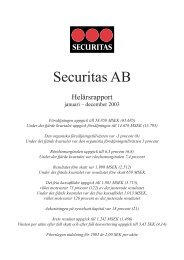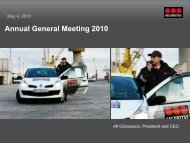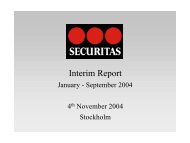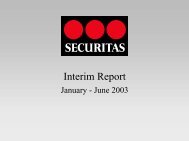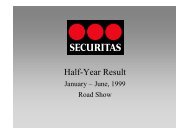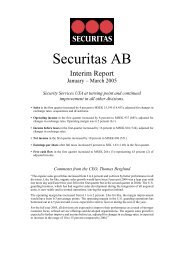Securitas AB Annual Report 2005
Securitas AB Annual Report 2005
Securitas AB Annual Report 2005
You also want an ePaper? Increase the reach of your titles
YUMPU automatically turns print PDFs into web optimized ePapers that Google loves.
<strong>Securitas</strong> is responsible for passenger, aviation staff and equipment security checks at<br />
Tegel airport in Berlin, to fulfi ll the very high security requirements placed on the airlines.<br />
Peter Balzereit is one of the airport’s 650 specially-trained guards.<br />
Growth targets<br />
Financial objectives are closely linked to the overall<br />
strategy. The growth target of 6-8 percent will be achieved<br />
through an even more customer-oriented approach.<br />
To expand the customer portfolio, further specialization<br />
is needed in specifi c areas. By increasing the share of<br />
Outlook<br />
The division continuously strives to<br />
add value by refi ning its services.<br />
The Mobile services unit is growing.<br />
The challenge in established markets<br />
is to prove that the development of<br />
<strong>Securitas</strong>’ services continually create<br />
added value for our customers. One<br />
way to do this is to develop and introduce<br />
new technology for security<br />
offi cers, a process that began in <strong>2005</strong><br />
and will continue in 2006. For new<br />
markets, mobile services offer a great<br />
opportunity. As labor costs rise, mobile<br />
services become a more cost-effective<br />
solution for small to medium-sized<br />
customers.<br />
In a labor-intensive business such<br />
as security, people are the most valuable<br />
asset, and efforts will continue to<br />
develop our staff. This starts early in<br />
the recruitment and initial training<br />
pro cess, where increasing demands are<br />
placed on specifi c security offi cer<br />
profi les. Specialized training programs<br />
are offered for certain business sectors.<br />
Michael Hammarström is a customer services operator at the monitoring center<br />
of Alert Services in Stockholm. He stays in touch with <strong>Securitas</strong>’ external alarm<br />
installers to ensure quality performance in the entire chain; from alarm to call-out,<br />
in accordance with the customer’s specifi c requests.<br />
combined solutions – guarding services and technical<br />
systems in a single, comprehensive agreement – for<br />
large customers, as well as mobile services for smaller<br />
customers, margins are expected to improve. In addition,<br />
the division is aiming to further strengthen its position<br />
in some countries through regional acquisitions.<br />
In 2006 the new organizational structure<br />
will allow further recruitment<br />
and training of selected employees<br />
throughout the division. This was done<br />
in <strong>2005</strong> in the Transport aviation<br />
unit, where security offi cers are being<br />
recruited and trained specifi cally for<br />
airports. This approach has resulted in<br />
lower employee turnover and tailormade<br />
services.<br />
Furthermore, numerous legislative<br />
and social initiatives are under way and<br />
will affect the industry and company in<br />
the next two years on both a national<br />
and pan-European level. In France,<br />
government plans call for increased<br />
training and licensing in 2007, which<br />
will be positive for the industry. The<br />
German market still poses a challenge,<br />
as it is highly fragmented and relatively<br />
untapped in eastern sections in<br />
terms of security services. There is still<br />
room for outsourcing, however, which<br />
is a positive structural factor.<br />
The nationwide licensing scheme in<br />
the United Kingdom will come into<br />
force in 2006 – a positive development<br />
for <strong>Securitas</strong> – and create a regulated<br />
environment for the industry and its<br />
customers.<br />
Eastern Europe is a fast-growing<br />
market, but still has a highly fragmented<br />
industry with little or no regulation.<br />
These countries pose a challenge<br />
when it comes to improving industry<br />
standards and working conditions.<br />
The security industry here is largely<br />
state-controlled and the police play a<br />
different role compared to many Western<br />
European countries. In this respect,<br />
these markets also represent a great potential<br />
for further growth for <strong>Securitas</strong>,<br />
as do the markets where it does not yet<br />
operate or has a low market share.<br />
Security Services Europe<br />
SECURITAS <strong>2005</strong> 53




